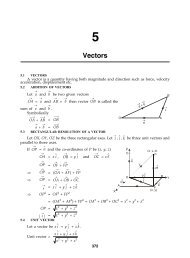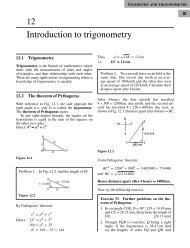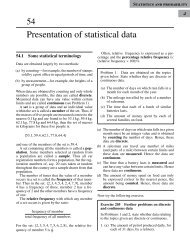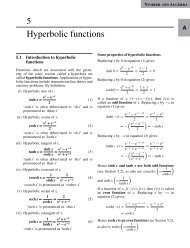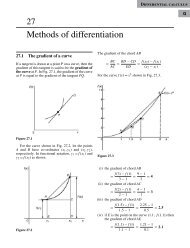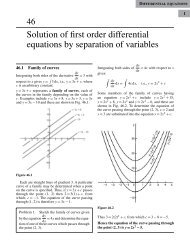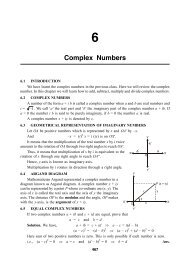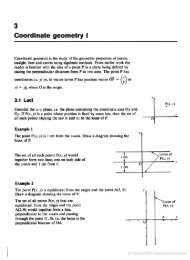integration
You also want an ePaper? Increase the reach of your titles
YUMPU automatically turns print PDFs into web optimized ePapers that Google loves.
394 INTEGRAL CALCULUS<br />
It is possible in this case to change the limits of <strong>integration</strong>.<br />
Thus when x = 3, u = 2(3) 2 + 7 = 25 and<br />
when x = 1, u = 2(1) 2 + 7 = 9.<br />
Hence<br />
∫ x=3<br />
x=1<br />
5x √ (2x 2 + 7) dx =<br />
= 5 4<br />
∫ u=25<br />
u=9<br />
∫ 25<br />
9<br />
∫ 25<br />
5x √ u du<br />
4x<br />
√ u du<br />
= 5 u 2 1 du<br />
4 9<br />
Thus the limits have been changed, and it is unnecessary<br />
to change the integral back in terms of x.<br />
⎡<br />
∫ x=3<br />
Thus 5x √ (2x 2 + 7) dx = 5 ⎣ u 3 ⎤25<br />
2<br />
⎦<br />
4 3/2<br />
x=1<br />
= 5 [√ 25<br />
u 3]<br />
6<br />
= 5 [√<br />
25<br />
9 6<br />
3 − √ ]<br />
9 3<br />
9<br />
i.e. the limits have been changed<br />
⎡ ⎤<br />
= 3 ⎢<br />
⎣ u 2<br />
1 9<br />
⎥<br />
4 1<br />
⎦ = 3 [√ √ ]<br />
9 − 1 = 3,<br />
2<br />
2 1<br />
taking positive values of square roots only.<br />
Now try the following exercise.<br />
Exercise 155 Further problems on <strong>integration</strong><br />
using algebraic substitutions<br />
In Problems 1 to 7, integrate with respect to the<br />
variable.<br />
[ ]<br />
1<br />
1. 2x(2x 2 − 3) 5 12 (2x2 − 3) 6 + c<br />
2. 5 cos 5 t sin t<br />
[<br />
− 5 ]<br />
6 cos6 t + c<br />
3. 3 sec 2 3x tan 3x<br />
[ 1<br />
2 sec2 3x + c or 1 2 tan2 3x + c]<br />
Problem 11.<br />
= 5 6 (125 − 27) = 812 3<br />
Evaluate<br />
∫ 2<br />
0<br />
3x<br />
√<br />
(2x 2 + 1) dx,<br />
taking positive values of square roots only.<br />
4. 2t √ (3t 2 − 1)<br />
5.<br />
ln θ<br />
θ<br />
6. 3 tan 2t<br />
[ 2<br />
9<br />
√<br />
]<br />
(3t 2 − 1) 3 + c<br />
[ 1<br />
2 (lnθ)2 + c]<br />
[ 3<br />
2 ln ( sec 2t) + c ]<br />
Let u = 2x 2 + 1 then du<br />
dx<br />
= 4x and dx =<br />
du<br />
4x<br />
7.<br />
2e t<br />
√ (e t + 4)<br />
[<br />
4<br />
√ (e t + 4) + c ]<br />
Hence<br />
∫ 2<br />
0<br />
∫<br />
3x<br />
x=2<br />
√<br />
(2x 2 + 1) dx = 3x du<br />
√ u 4x<br />
= 3 4<br />
x=0<br />
∫ x=2<br />
x=0<br />
u −1<br />
2 du<br />
In Problems 8 to 10, evaluate the definite integrals<br />
correct to 4 significant figures.<br />
8.<br />
∫ 1<br />
0<br />
3x e (2x2 −1) dx [1.763]<br />
Since u = 2x 2 + 1, when x = 2, u = 9 and when<br />
x = 0, u = 1.<br />
Thus<br />
3<br />
4<br />
∫ x=2<br />
x=0<br />
u −1<br />
2 du = 3 4<br />
∫ u=9<br />
u=1<br />
u −1<br />
2 du,<br />
9.<br />
10.<br />
∫ π<br />
2<br />
0<br />
∫ 1<br />
0<br />
3 sin 4 θ cos θ dθ [0.6000]<br />
3x<br />
(4x 2 dx [0.09259]<br />
− 1) 5



